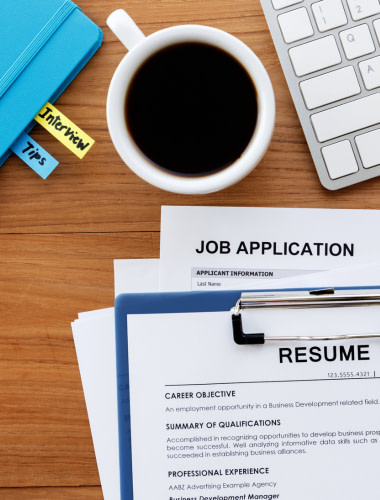This article is recommended for individuals near the beginning of their careers

Is your cover letter letting you down?
Having spent years in the field of recruitment, I understand the challenges that come with writing an effective cover letter. For example, many job seekers struggle to:
A cover letter isn't just a mere formality; its purpose is to make a strong impression on a prospective employer and get you to the next stage of the process - a phone screening interview.

What is the purpose of a cover letter?
Address the requirements of the job
The primary purpose of your cover letter is to link your skills and experience with the requirements of the position. Think of it as the key selection criteria for the vacancy. It's not meant to rehash the information found in your resume, but rather to highlight the relevant experiences, accomplishments, and capabilities that directly align with what the company is seeking.
It's your opportunity to introduce yourself
Your cover letter gives you the opportunity introduce yourself to your prospective employer and provide context for your application. It's your chance to let your personality shine through and show that you've done your research on the company and position you are applying for.
Explain employment gaps or career changes
If you have gaps in your employment history or are transitioning to a new career, a cover letter provides a space to explain these circumstances and present them in a positive light.

Generic vs tailored approach
I can't stress enough how crucial it is to tailor your cover letter for each position you apply for. It might sound like a tedious task, but there's a solid reason behind it.
Limitations of a generic cover letter
For a prospective employer, receiving a generic cover letter feels like opening an empty envelope. It doesn't tell them anything about why you're the right fit for the role; it's a missed opportunity for you to align your skills and experiences with what they are looking for.
By providing a generic cover letter you are telling your prospective employer that you have not done your homework; that you haven't bothered to understand what the company does and how you could contribute to it, and why you might be suitable for the role by addressing the selection criteria. Frankly, it leaves them wondering if you're genuinely interested in the job or just submitting applications en masse.
Benefits of a tailored cover letter
Tailored cover letters are key to grabbing your prospective employer's attention. When you take the time to customise your cover letter, you're able to bridge the gap between the requirements of the job and your relevant experiences, skills, and achievements. It's the equivalent of handing your prospective employer a roadmap to see why you may be the right candidate for the position.
But that's not all. A well-crafted, tailored cover letter also reveals your genuine interest in the position and the company. It's like saying, "Hey, I've done my research, and I'm excited about the opportunity." It's a sign of dedication and effort, and it can set you apart from the crowd of applicants who took the easy way out.
Another reason to write a cover letter
Crafting a tailored cover letter isn't just about impressing the reader. It's also a chance for you to reflect on whether this role is truly the right fit for you. It's like trying on a suit before you buy it - you want to make sure it fits comfortably. By tailoring your cover letter, you're giving yourself the chance to think about how your skills align with the role, whether the company's values resonate with you, and if this is a place where you can thrive.

Cover letter writing tips & examples
Demonstrate you have read the job ad
State the position you're applying for. Make sure you list the position accurately with correct spelling - failure to do so demonstrates a lack of attention to detail.

Address why you are looking for a new role
Be upfront about why you are looking for a new role, especially if it is outside of your control. For more information regarding this topic, read my blog post how to tell prospective employers why you are job hunting.

Address each selection criteria
It is okay to apply for jobs where you don’t meet all the selection criteria. However, if you do, you should address why you are applying and what might compensate for what you are lacking.
If you are struggling to meet most of the selection criteria, you may want to re-evaluate applying.

Communicate your desire for the job
Give the recruiter insight into why you at least want to discuss the role. Acknowledge the nature of the job, highlight your capability to succeed in the role, and talk about why you are interested in the company.

Stick to the facts
Your prospective employer is not interested in your opinion or self-praise. While you may consider yourself "confident" and "adept", you should not describe yourself as such in your cover letter. Instead, use factual examples that demonstrate your abilities - so the reader can form their own opinion.

Use professional language
Make yourself the active subject of every sentence, do a spell check, and reread your cover letter to make sure it is perfect. Get someone else to proofread it before you submit your application.

Differentiate your cover letter from your resume
Your cover letter should not simply be a copy of your resume. Think of yourself as a salesperson - your resume is a brochure and your cover letter is a sales pitch.
Your cover letter should tell your prospective employer why they should read your resume, and what they should look out for when doing so. It's an effective tool for highlighting why you should be considered for a screening interview.

Critical cover letter don'ts
Don't defer to your resume
Having a cover letter that simply states “The enclosed resume will provide you with the information regarding my employment background, training and skills” does not assist the recruiter. Your cover letter is an important complementary document with its own unique purpose.
Don't complain
Complaining about other employers, recruitment agencies, or processes will reflect poorly on your character.
Don't include statements like "I have put a lot of time into my cover letter, only to have it ignored." This is an off-putting mentality, and nobody wants to spend time reading about how much someone hates their process before they’ve even started.
You should also take care to avoid badmouthing your previous employer, as this could make you look bad. Complaining about your last workplace may give give the impression that you are whinger. Plus, your prospective employer may infer that you are likely to complain about them in the future.
Don't include your referees' contact details
Even if you think your referees are truly exceptional, you should not mention them in your cover letter, as this is too early in the recruitment process.
If you're interested in learning more about when your referees should come into play, click the button below to read my blog post on the topic.

How to use ChatGPT
If you're finding it difficult to write a tailored cover letter for every job you apply for - or, if you simply wish to save some time - then you should consider using ChatGPT.
Click the button below to read my step-by-step guide on how you can use ChatGPT to write a cover letter.

Remember, the journey towards your dream job starts with that introductory step - make it count.
Now that you are equipped with the knowledge to write an effective cover letter, you can click the button below to explore my guide on how to improve your resume.


Are you looking for a job?
Now that you know how to write a cover letter, you should take a moment to check our current vacancies page.
At 11 Recruitment, we have a range of white-collar temp and perm jobs available. We're always on the lookout for top talent to place with our clients, so we encourage you to apply for any positions that are of interest.
If none of our current vacancies are right for you, you should register for job alerts. Then we’ll be able to notify you when we receive a position that matches your profile.

What are your thoughts?
I'd love to have a conversation with you about this topic - please leave a comment below if you have any thoughts or opinions 🙂
Christian Madsen
Managing Director of 11 Recruitment





















Great advice Christian. I found it very helpful when writing my cover letter. Thanks!
Hi Louise, thanks for taking the time to leave a comment. I’m glad to hear you enjoyed the article 🙂
If you haven’t already, I encourage you to read my article on how to use ChatGPT to write a cover letter: https://11recruitment.com.au/blog/how-to-use-chatgpt-to-write-a-cover-letter/
ChatGPT is a great tool for making the cover letter writing process less time-consuming!